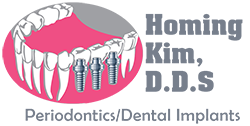FAQs
What should I expect on my first visit? How much will dental implants cost?
A dental implant is a titanium “root” placed in the jaw bone to support a crown(s). The cost depends on many factors including:
- The quality and amount of natural bone. It is very common to have inadequate bone levels after a tooth has been removed. Bone grafting may become necessary and can cost several hundred dollars.
- The number of teeth that need to be replaced. We could be talking about a single implant for a single crown, several implants and crowns, implants for a bridge, or a complete implant supported denture. The more implants, the more cost. Implants generally run between $1800-$2500. And the restorative treatment is a separate fee that you will need to discuss with your general dentist.
- Sedation. We offer several options, and will discuss in detail at your consultation. Insurance does not pay for any form of sedation.
How much will periodontal treatments hurt?
Periodontal disease often causes no symptoms in its early stages. Unless it is treated, it will worsen. It can damage the gums, bone and other tissues and may cause loss of teeth. Some risk factors can be controlled, others can’t. Here a few that may put you at risk.
- Smoking
- Poor oral hygiene
- Diabetes
- Stress, teeth-grinding, clenching
- Hormone changes
- Weakened immune system
- Close family member with periodontal disease
- Certain medications
The disease starts when tartar and bacteria under the gumline lead to infection. As your body fights it, your gums become inflamed and tender, and unfortunately, people tend to brush less because it may be painful. This inflammation is called Gingivitis. Bleeding may occur. If hygiene is not properly maintained, it can progress to Periodontitis.
Periodontitis is when the infection and inflammation spread to the bone supporting the teeth. Pockets deepen and become difficult to clean. Teeth may start to feel loose.
Advanced Periodontitis is when pockets deepen even more and fill with pus. Gums may swell, and hot and cold-sensitivity may occur. This may lead to extractions if not corrected surgically.
Periodontal surgery is required when gum disease has worsened and advanced, leading to inflammation that can destroy bone and surrounding tissues. Your gums may separate from the teeth and cause pockets that trap bacteria that lead to infection. The only way to remedy it is through periodontal/osseous surgery.
What if I don't have dental insurance?
We work with many patients that do not have dental insurance. We will try to treatment plan
the best options for your budget. We also work with CareCredit which is a monthly payment
company that offers no interest if you pay your balance off within a year.
What should I expect on my first visit/consultation?
- As with all offices, there is some preliminary paperwork that you will need to fill out about your dental and medical history. Please have a list of all medications that you currently take. We can mail this information to you prior to your visit if you would like.
- X-rays will almost always need to be taken. Sometimes we can get them from your general dentist’s office if they are fairly recent and show us what we need to see.
- Dr. Kim will do an exam and go over all of your options. While that is happening, your insurance information will be collected. We will type up the best treatment plan for you and you will have a written estimate of all treatment to be done in our office.
- Then it is up to you. We can schedule your treatment, or you are welcome to go home and think it over.
What should I expect post-op?
Post-op expectations:
- Most of our procedures have similar instructions for after surgery.
- The most important thing we tell everyone is to TAKE IT EASY. Do not plan on going to work the next day (or several days depending on your treatment). Do not do any heavy lifting, don’t cut firewood, don’t run a marathon, just relax and let your body heal.
- We will prescribe pain medications that will help with discomfort.
- Ice packs are always good for swelling.
- We will see you in 10-14 for a post-op follow-up.
Does periodontal disease go away?
Only with treatment by a professional.
What are the stages of periodontal disease?
- Our office will provide detailed instructions to help you achieve the best outcome. Typically, patients will require pain relief medications in the days following the surgery. You will be asked to avoid strenuous exercises and to eat a soft food diet. Not smoking will also help your healing go smoother and faster.
- The complete healing process can take several weeks. The better you are at following instructions, the better off you will be. Of course, all patients are different, and most of them can return to work and normal schedules after 3-5 days.
- Cold-sensitivity is the most common result, and will diminish over time.
